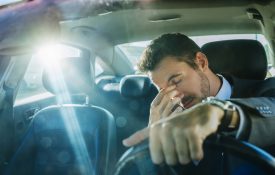-

Can People Tell When They’re Too Sleepy to Drive Safely?
Drowsy driving may receive less media attention than drunk driving, but research shows that it’s startlingly common and can be just as dangerous as driving while drunk. A 2010 poll from the AAA Foundation found
-
How Trustworthy Is The Voice of Your GPS?
One goal of the voice-based GPS directions is to ensure that drivers are able to keep their eyes and attention on the road while navigating. But how do people respond when the navigation instructions come from Yoda, Mr. T, or Burt Reynolds? New research from psychological scientists David R. Large and Gary E. Burnett of University of Nottingham suggests that drivers’ decision making and behavior on the road can be influenced by the voice of their GPS. Driving directions from a Jedi Master may be hilarious, but drivers don’t necessarily believe the Force is strong with their GPS when the navigation directions come from Yoda.
-
Risky Drivers More Likely to Ignore Road Rules Even as Pedestrians
We’ve all seen it before -- distracted pedestrians who dart across the street without thinking and drivers who speed through intersections and stoplights as if they owned the road. Depending on how you typically get around, it may be tempting to generalize about the other camp and conclude that either pedestrians or drivers are more prone to unwise behavior. But new research shows that unsafe road behavior is more about the individual person than it is about the particular mode of transport: Some people are just more likely to take risks on the road, whether they’re behind the wheel or not.
-
Does Punishing Speeders Prevent Speeding?
Speeding leads to more car accidents worldwide than almost any other behavior behind the wheel. The World Health Organization (WHO) has cited speeding as the main cause of nearly 30% of all serious or fatal crashes across the globe. Despite the risks of death or injury, people often admit to intentionally speeding. International studies have found that between 66% and 85% of drivers admit to exceeding speed limits. Although measures like speed traps and red-light cameras aim to cut down on speeding, it’s unclear whether these penalties actually improve behavior on the road.
-
Are Angry People Also Angry Drivers? Not Necessarily
Whether you’re a driver, a pedestrian, or a cyclist, chances are you’ve had at least a few first-hand experiences with someone with an anger problem behind the wheel. Aggressive driving, which includes deliberately driving unsafely in order to punish or get even with someone, is a major road hazard. A study from the AAA Foundation looking at more than 10,000 road rage incidents found that altercations between angry drivers resulted in at least 218 murders and another 12,610 injury cases over the course of seven years.
-
Navigating Familiar Roads May Lead to Driving on “Autopilot”
For years, data on car accidents has consistently shown that drivers are most likely to crash at locations very near their homes. At first glance it might seem like this phenomenon occurs because people spend the most time driving close to home. However, a recent study suggests that it may actually due to the fact that drivers are less attentive and aware when they’re driving on familiar roads.

